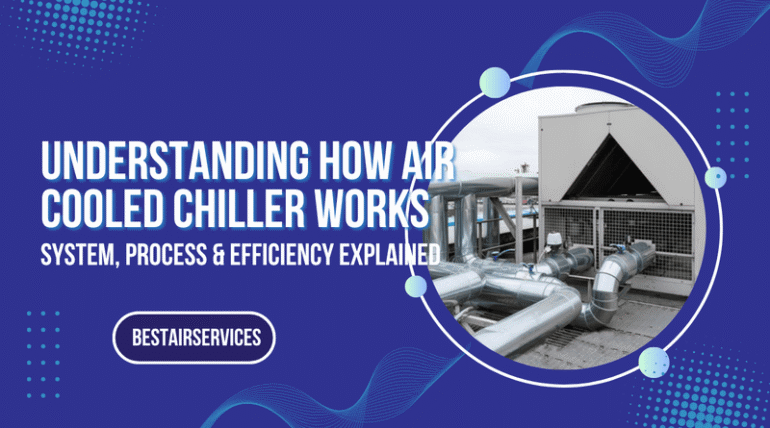
October 10, 2025
Facility owners in charge of cooling systems must comprehend how air-cooled chillers operate in areas like Ajman, Al Ain and Dubai, where temperatures can rise above 45°C. The foundation of many commercial and industrial HVAC systems, these chillers provide consistent operation without using excessive amounts of water.
Air-cooled systems, as opposed to water-cooled chillers, dissipate heat using ambient air, which makes them perfect for buildings without cooling towers or water supplies. This blog helps you make well-informed decisions about system upgrades and maintenance by outlining their main features, advantages, and operating principle.
Understanding the Air Cooled Chiller Working Principle
Through a refrigeration cycle, an air-cooled chiller extracts heat from a liquid (typically water or a glycol mixture) and then releases that heat into the surrounding air. There are usually four major stages in the cycle:
- Evaporation: The refrigerant turns into vapor by absorbing heat from the process water.
- Compression: The compressor raises the temperature and pressure of the vapor by compressing it.
- Condensation: The heated vapor travels through coils of an air-cooled condenser, where fans remove heat by blowing in outside air, turning the vapor back into liquid.
- Expansion: After lowering its pressure through an expansion valve, the refrigerant returns to the evaporator to complete the cycle.
For use in manufacturing facilities, data centers, malls, and factories, this closed-loop system offers reliable cooling.
Key Components of an Air Cooled Chiller System
An efficient air cooled chiller relies on several critical components working together:
- Compressor: The heart of the system that compresses and circulates refrigerant.
- Condenser Coils: Responsible for heat rejection using ambient air.
- Evaporator: Facilitates heat absorption from the chilled water loop.
- Expansion Valve: Controls refrigerant flow and pressure.
- Fans: Draw in ambient air across condenser coils for heat dissipation.
- Control Panel: Manages operational settings, safety shutdowns, and performance tracking.
Every component helps ensure long system life, energy efficiency, and ideal cooling performance.
Advantages of Air Cooled Chillers for Dubai Businesses
For industrial and commercial applications, air cooled chillers offer several advantages over traditional cooling systems:
✅ Lower Water Consumption – Since they rely on air for cooling, they are ideal for arid climates like the UAE.
✅ Simpler Maintenance – No cooling towers or water treatment required, reducing maintenance costs.
✅ Easy Installation – Compact and suitable for rooftop or outdoor setups.
✅ Energy Efficiency – Newer models use scroll or screw compressors with variable speed drives for better performance.
✅ Durability – Designed for outdoor use with corrosion-resistant materials.
The U.S. Department of Energy claims that switching to high-efficiency chillers can result in a 30% reduction in energy usage.
Maintenance Tips for Long-Term Efficiency
Your air-cooled chiller’s lifespan and efficiency depend on proper maintenance. This is a brief checklist for maintaining an air-cooled chiller:
- Regularly clean condenser coils to prevent airflow blockage.
- Inspect and replace fan belts and bearings as needed.
- Check refrigerant levels and inspect for leaks.
- Monitor temperature differentials and compressor amperage.
- Conduct annual preventive maintenance by certified HVAC professionals.
Applications of Air Cooled Chillers
Air cooled chillers are widely used in:
- Commercial complexes and office buildings
- Hospitals and laboratories
- Industrial production lines
- Food processing and cold storage facilities
Their ability to handle varying loads while maintaining temperature precision makes them a preferred choice for Ajman’s industrial sector.
Final Thoughts
Understanding how air cooled chiller works helps facility managers and technicians ensure efficient operation, lower energy costs, and fewer breakdowns. Whether you need installation, air cooled chiller maintenance, or compressor overhauling, BestAir Services is your trusted partner in Ajman and across the UAE.
Yes, modern air cooled chillers can efficiently serve large-scale plants with modular designs and advanced control systems.
Ideally, every 3–6 months, depending on usage intensity and environmental conditions.
With proper care, most systems last 15–20 years.


